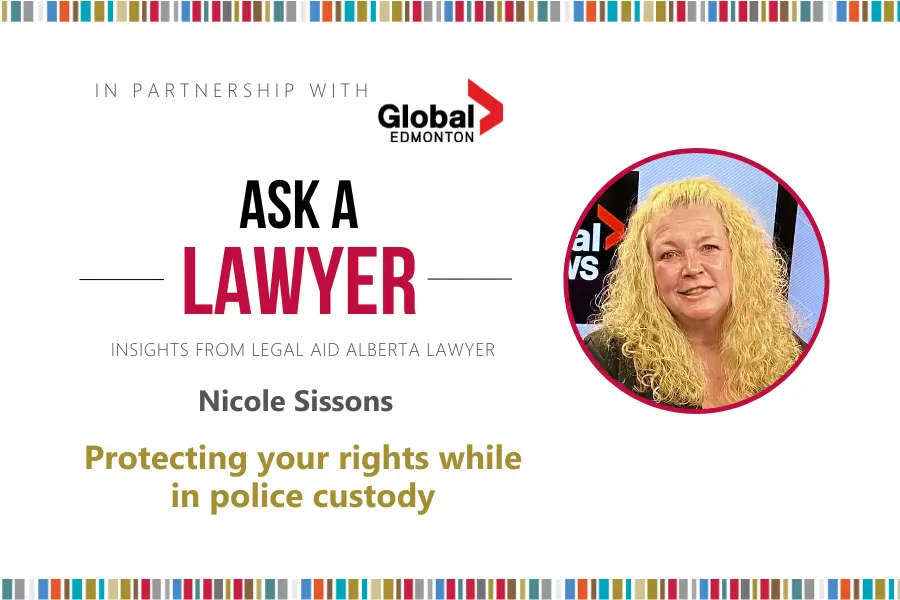Legal Aid Alberta is available all day every day to protect our Charter rights
Hospital emergency rooms don’t shut down overnight, firefighters don’t lock up the station for the evening and police keep patrolling our streets after dark.
Just as these essential services operate around the clock, so do Legal Aid Alberta staff lawyers who handle a special phone line running 24/7 to protect the Charter rights of people who are under arrest or being detained by police.
LAA staff lawyer Nicole Sissons appeared on the July 2 segment of Ask A Lawyer on Global Morning News to share insights into how LAA provides immediate access to justice and what a person’s rights are when being held by police.
Watch the Ask A Lawyer segment here:
Please view the video using the Microsoft Edge browser.
Transcript of the program:
Vinesh Patrap: Hospital emergency rooms don’t shut down overnight, and firefighters don’t lock up the station for the evening and police keep patrolling our streets after dark. Just as these essential services operate around the clock, so do Legal Aid Alberta lawyers who handle a special phone line running 24/7 to protect the Charter rights of people being detained by police. Here to tell us about the Brydges phone line is Legal Aid Alberta staff lawyer Nicole Sissons.
Nicole, thanks so much for joining us today.
Nicole Sissons: My pleasure.
Vinesh: I’ve gone to court but I’ve never heard of this phone line. What is this about?
Nicole: The Brydges phone line is a 24-hour-a-day, 365-days-a-year phone service that is manned by Legal Aid Alberta (staff) lawyers answering calls from people that are freshly arrested, so you can exercise your Charter-protected right to have counsel to assist you once the police have detained you or arrested you.
Vinesh: It’s 24-7, so even operating on Canada Day, for example. So take us through the process.
Nicole: I answer the phone and I start asking you why you have been detained, what has happened to you. Contrary to popular belief, I get a lot of calls from people who have had no contact with the justice system until they call me. When they call me, they are very scared, they are in a situation that they have never been in.
They are confused and they don’t know what to do. I calm them down, I give them advice as to how to deal with the police and then I tried to tell them what will happen as they move forward, to make the system less intimidating for them and to make sure that they understand that they have access to justice; that there will be free duty counsel in court for them and that they can apply to legal aid to have a lawyer assist them in court, that everything will be OK, and that their rights will be protected.
Vinesh: I know for legal aid there is a certain (financial) threshold for people who are eligible. But can anyone phone to this line and you help them through that process if they are eligible for legal aid or not?
Nicole: It is a free service. The Brydges line is for everyone. It’s access to justice for all. At that stage in the proceedings I would give them advice as to how to apply for a legal aid lawyer and what will happen is the (Legal Aid Alberta) bail team that will eventually speak to them – and I will tell them about this – will assist them to apply for a lawyer through Legal Aid Alberta and the guidelines financially for assistance – they have changed. So it is worth it to make the application and then go through it and see what happens.
Vinesh: What if people believe they have done nothing wrong?
Nicole: That’s a tricky situation because I can tell you that if you are arrested by the police or detained by the police, they have reason to believe you have done something wrong. They think you’ve done something wrong. You may not have. And don’t get me wrong – I respect the police. They have a tough job. They do the job to the best of their abilities. But that is not an even playing field when you are arrested by them, they are trained interviewers, they have years of experience and it’s just you thinking you’ve done nothing wrong. And at that stage it is important that you speak to me so that you do not make mistakes that could affect you for the rest of your life.
Vinesh: When you get people calling in, is there an age range or – it covers all demographics?
Nicole: All demographics.
Vinesh: And all types of crimes, are we talking about here as well?
Nicole: Yes.
Vinesh: How frustrating can it be from your point of view when you are talking to people and they might be caught up in an emotional state and not fully understanding what they are going through, and you have to work with them through that process.
Nicole: It’s not frustrating for me, but it is something where I really need to help calm them. I am not frustrated; I really want to not be frustrated with them and assist them because what I don’t want is I don’t want somebody to give a false confession. Because we as people want to explain ourselves and also when we are dealing with people in authority, we want to answer them. What people don’t know is that the police have interview techniques. They can say they have evidence they don’t have to get you to talk and if you think “Oh, I should just say something because they want me to,” you could say something that basically could end up as a false confess, an unlawful conviction, ultimately. These are very serious matters, this is your liberty, right? Your whole life.
Vinesh: Yeah. Your liberty. Quickly, the number that people can call?
Nicole: I’m sorry I don’t have the number on me, but they can look it up online and it is provided, at every police station they have posters on the wall and the police will actually provide the number to them and so it won’t be a problem for them to access the line.
The police have an obligation to give them access to that line. They have to give then the information about the line – the number – and they have to give them an opportunity to implement their right to counsel as well. So, if they are arrested or detained by police … that’s the number that is going to be provided to them. It is a number that should only be used by those who are freshly arrested or detained by police.
Vinesh: Thank you for coming in and giving us this lesson on the Brydges phone, a very import service for the community.


